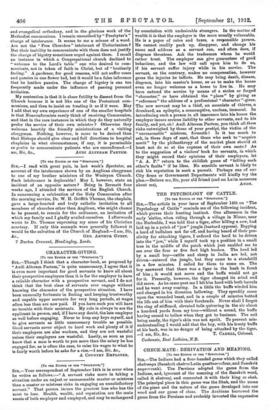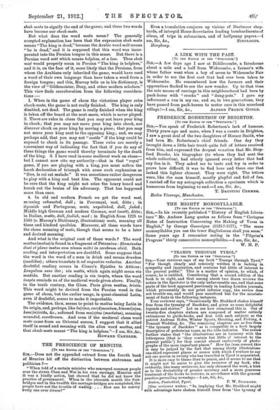CHECK-MATE : DERIVATION AND MEANING.
[To THE EDITOR OF THE "SPECTATOR."] SIR,—The Indians had a four-handed game which they called chatranga (Sanskrit chatr=Latin guattuor=four, and Sanskrit anga=rank). The Persians adopted the game from the Indians, and, ignorant of the meaning of the Sanskrit word, called it shatranj, and connected it with their king or shah. The principal piece in this game was the Shah, and the name of the piece and the nature of the game developed into our word and our game of chess. The Arabians borrowed the game from the Persians and probably invented the expression
shah mata to signify the end of the game; and these two words have become our check-mate.
But what does the word mats mean? The generally accepted explanation has been that the expression shah mata means "The king is dead," because the Arabic word wit means "he is dead," and it is supposed that this word was incor- porated into the Persian tongue in this sense. But there is a Persian word mat which means helpless, at a loss. Thus shah vita would properly mean in Persian "The king is helpless," and it is, on the face of it, more likely that the Persians, from whom the Arabians only inherited the game, would have used a word of their own language than have taken a word from a foreign tongue ; and this, Murray tells us in his dictionary, is the view of " Gildemeister, Dozy, and other modern scholars." This view finds corroboration from the following considera- tions :-
1. When in the game of chess the victorious player cries check-mate, the game is not really finished. The king is only disabled, not dead. The game is really finished when the king is taken off the board at the next move, which is never played. 2. There are rules in chess that you may not leave your king in check ; that you may not move your king into check, nor discover check on your king by moving a piece; that you may not move your king next to the opposing king ; and, we may perhaps add, that you may not " castle " if the king could be exposed to check in its passage. These rules are merely a convenient way of indicating the fact that if you do any of these things the game would thereby terminate by the death of the king. 3. I have read in some medieval work on chess— but I cannot now cite my authority—that in that " royal" game, if you are playing with a king, you must soften the harsh declaration of triumph with some such euphemism as "Sire, le roi est malade." It was sometimes rather dangerous to play with a king and beat him. The opponent could not be sure that the king might not seize the heavy board and knock out the brains of his adversary. That has happened more than once.
4. In old and modern French we get the word mat, meaning exhausted, dull ; in Provençal, mat, ditto ; in Spanish and Portuguese, mate, unpolished, dull, faded ; Middle high German and modern German, mat (matt), ditto; in Italian, matto, dull, foolish, mad ; in English from 1225 to 1560 (v. Murray's Dictionary, illustrations) mate, meaning all these and kindred qualities. Moreover, all these words have the chess meaning of mate, though that seems to be a later and derived meaning.
And what is the original root of these words The word meatus (matus) is found in a fragment of Petronius : Staminutas dixi et plane malts sum, vinum mitri in cerebrum Odle. Both reading and interpretation are doubtful Some suppose that the word is the word of a man in drink and means drunken (madidus); others translate it ad angustias reductus. Another doubtful reading occurs in Cicero's Epistles to Atticus : Longulurn sane iter ; via matta, which again might mean via madida. But another reading is via inepta, where the word inepta reminds us of the medieval words given above. Finally, in the tenth century, the Gloss. Paris gives radius, tristis. This word might be derived from the Persian word in the game of chess, but the earlier usage, in quasi-classical Latin, even if doubtful, seems to make it improbable.
The evidence, then, seems to point to matt= being Latin in its origin, and, perhaps, like lu(c)na, cae(d)mentum,binotni(n)us, lunn(in)icida, &e., softened from ma(c)lus (mactatus), meaning wounded, overthrown. And even if the medieval chess word mate came from an Oriental source, I suggest that it allied itself in sound and meaning with the alien word matins, and that check-mate meant "The king is helpless."—I am, Sir, &c.,
HOWARD CANDLER.











































 Previous page
Previous page